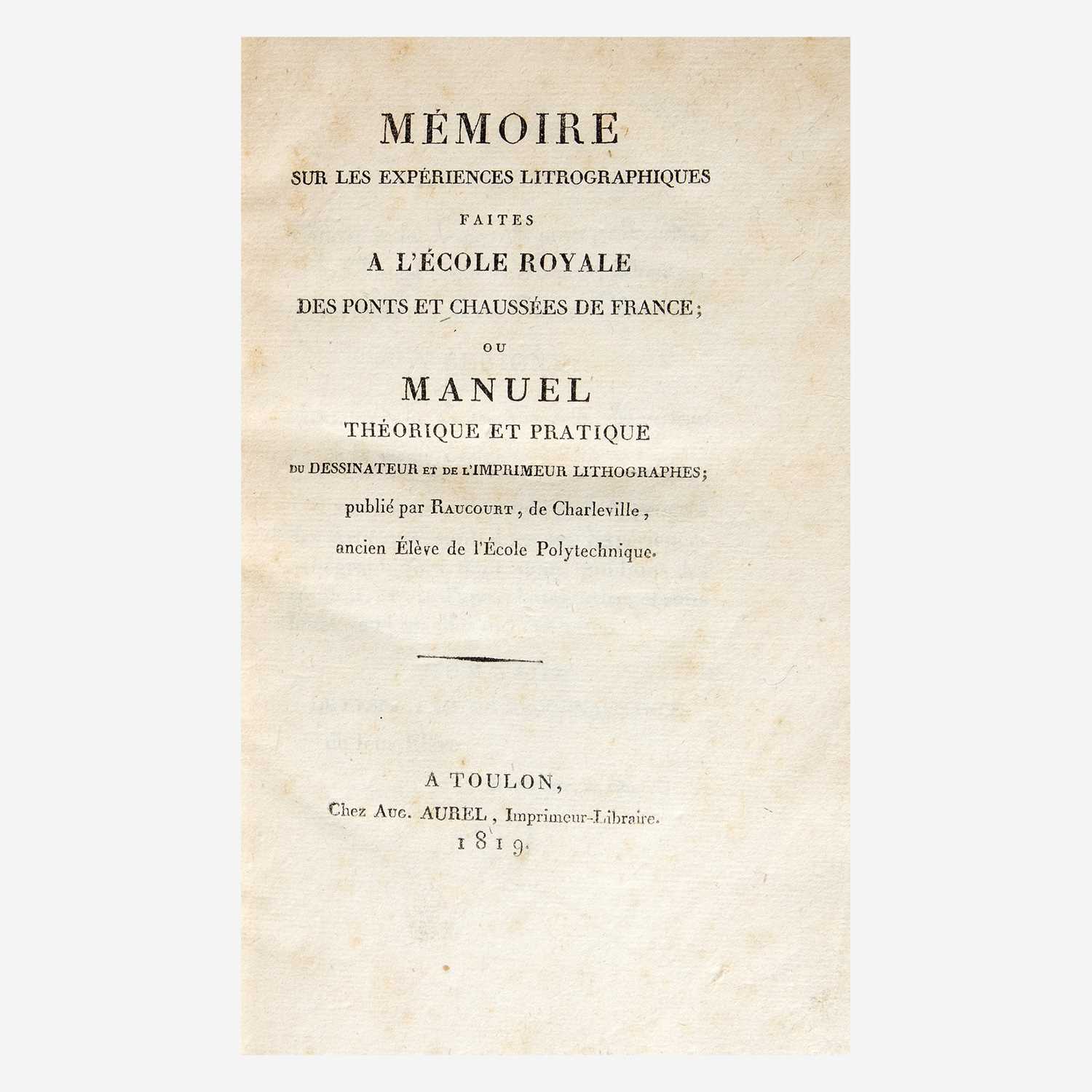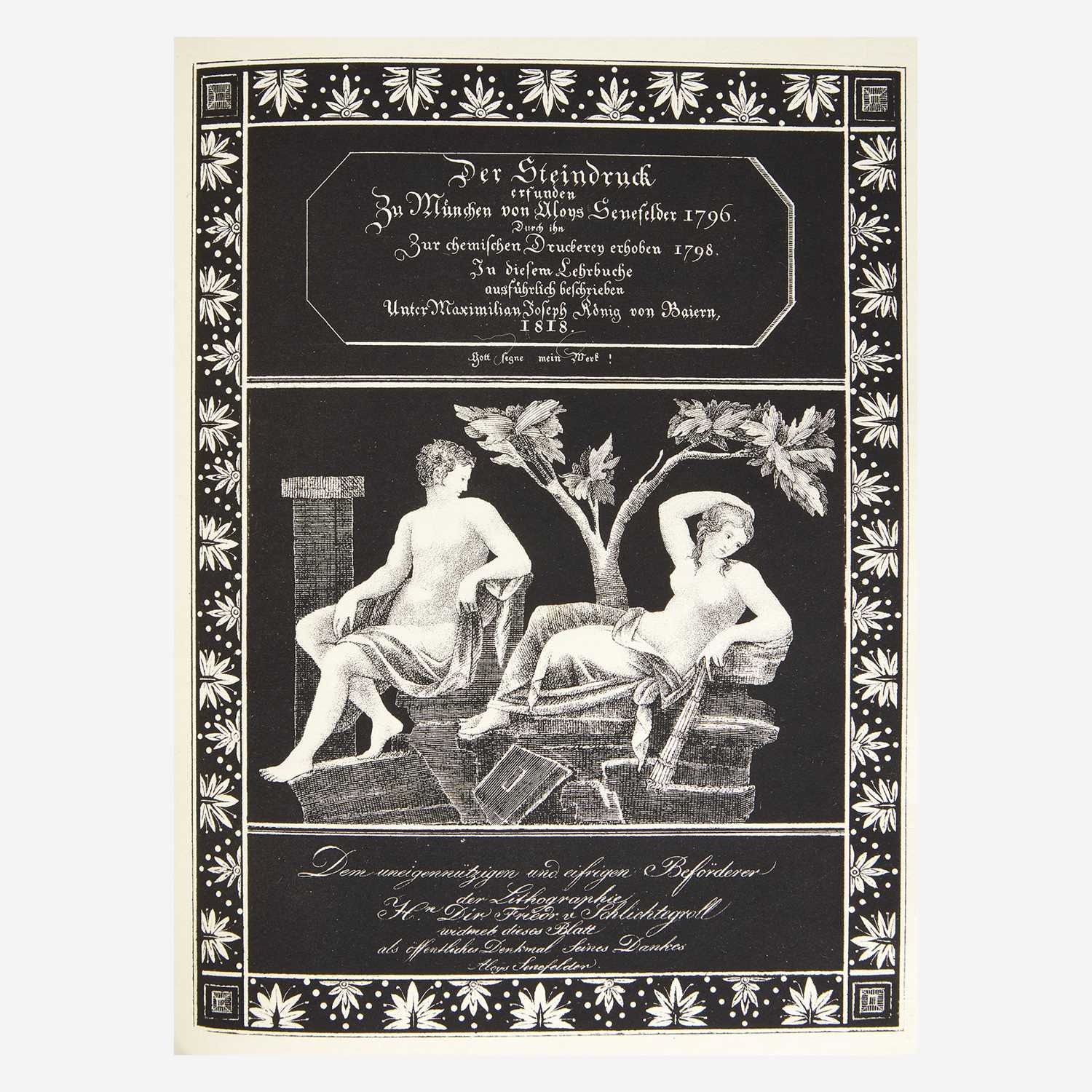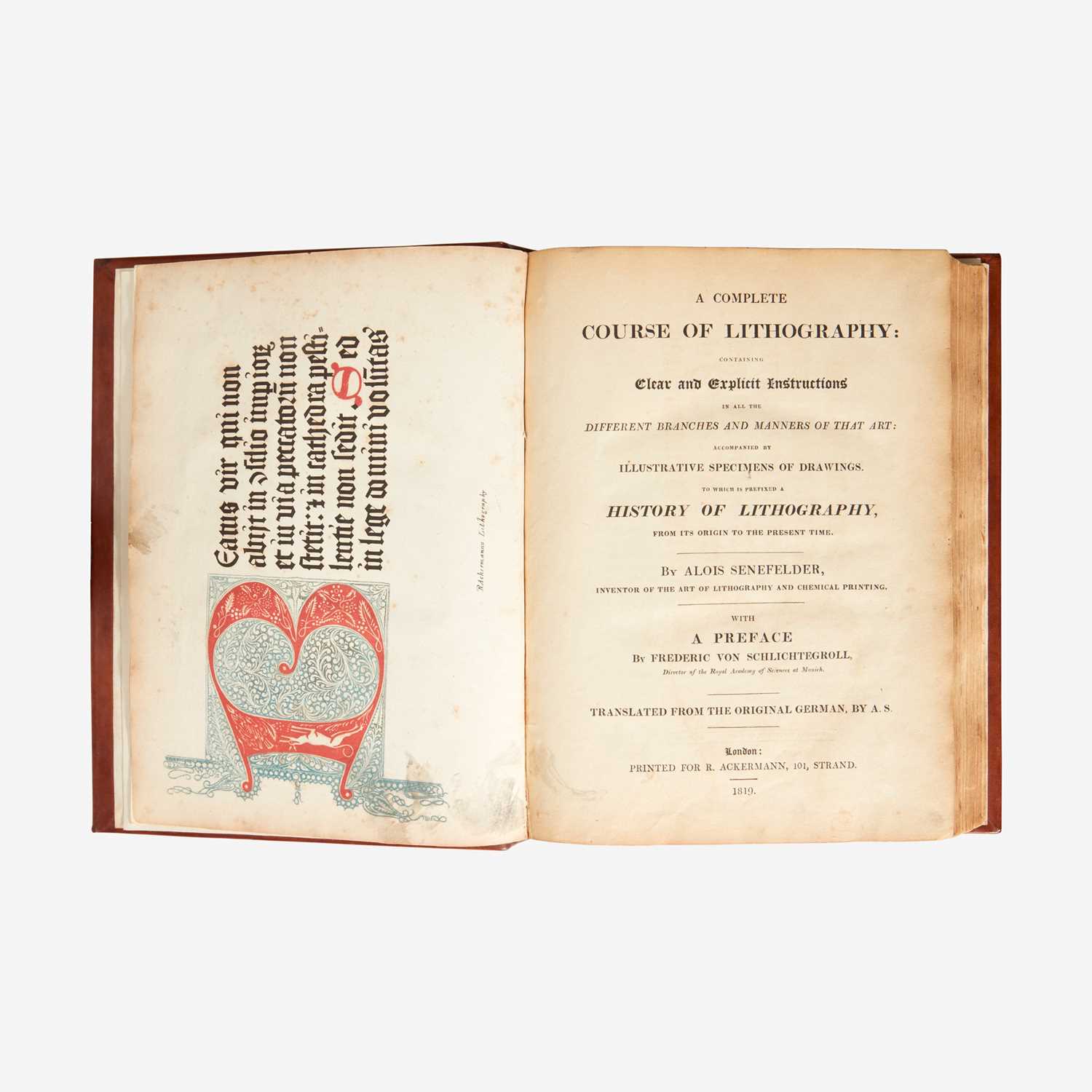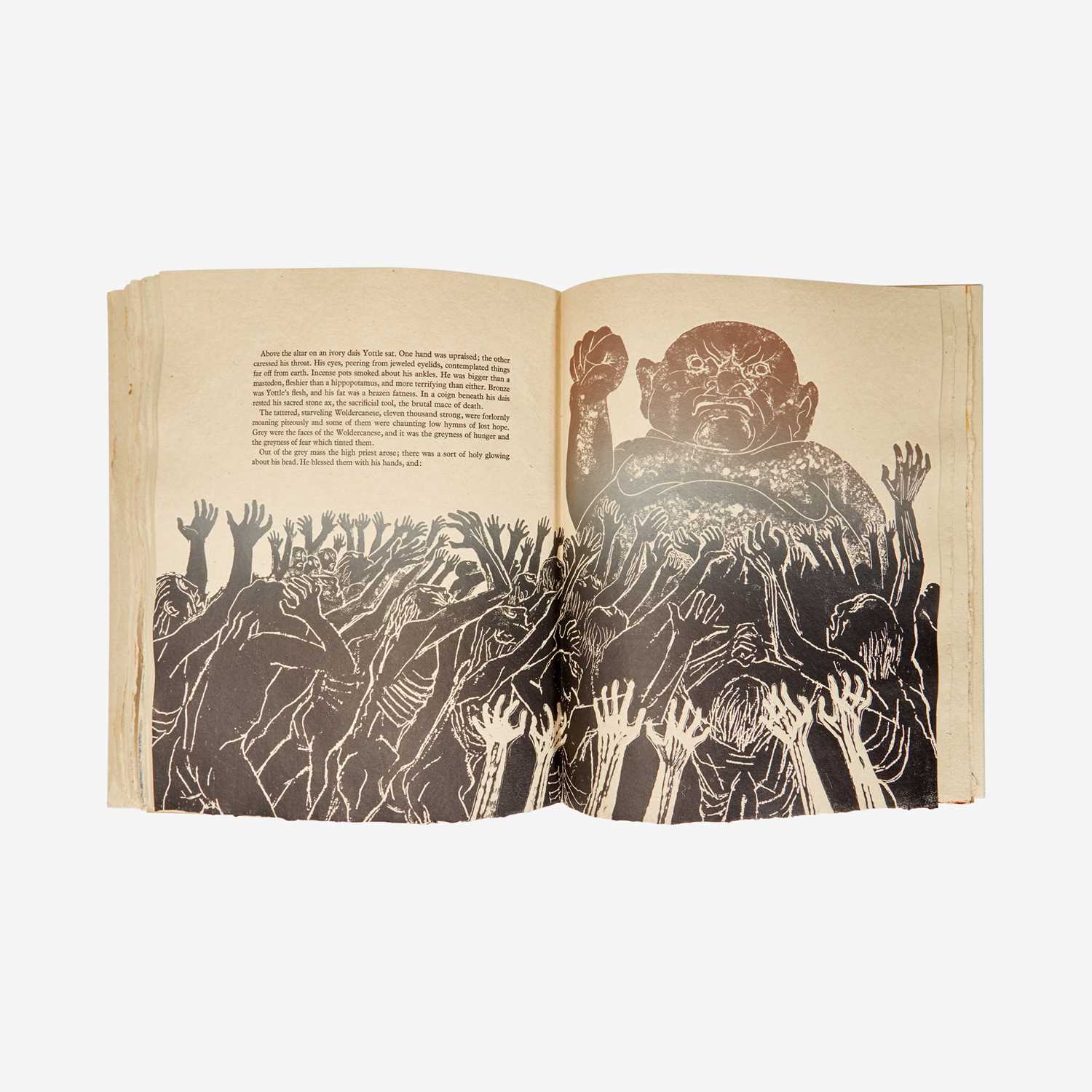[African-Americana] Freedmen's Bureau Labor Contract and Other Documents Relating to the Plantation of John Heard Burns Caddo Parish, Louisiana, 1865. Mini-archive of four items relating to the plantation of John Heard Burns, including one partially-printed Freedmen's Bureau labor contract, listing 22 formerly enslaved African Americans, with their names and signatures ("x"). Also listed are their ages (15-58), laborer class designation (1-3), as well as their wages which appear as payment-in-kind using pork, corn, flour, etc., in lieu of cash (notably, "monthly" in the wages box, is crossed out). In one case there is a deduction for travel: "wages deducted for time lost to go to Mobile". Signed by plantation owner J.H. Burns, and countersigned by Freedmen's Bureau Assistant Superintendent, H.F. Peevy, dated August 9, 1865. One partially-printed federal tax receipt, certifying that Burns paid $6.48 for "the collection of direct taxes in insurrectionary districts" on 1,000 acres of land valued at $4,092, signed for the commisioners of Direct Taxes for Louisiana, dated September 7, 1865. One partially-printed Caddo Parish tax receipt for $108.45, signed by Sheriff and Collector, J.W. Pickens, dated May 15, 1865. One carte de visite portrait of Burns. Condition varies; labor contract separated along center vertical fold, as well as bottom left fold, other small separations and chips along folds. A very rare survival. Freedmen's Bureau labor contract, between 22 newly emancipated African Americans and their former slave holder, dated just four months after the end of the Civil War. Located near Bethany (Lickskillet) in Caddo Parish, in northwestern Louisiana, the Burns plantation covered 1,000 acres and grew cotton, corn, wheat, potatoes, etc. The Freedmen's Bureau, established a month before the end of the Civil War, was critical in helping formerly enslaved African Americans, like the above, negotiate their new freedom--devising labor contracts and settling labor disputes, providing food, shelter, building schools and hospitals, and providing legal aid--all while operating against intense hostility from local white populations. Although this contract granted these 22 formerly enslaved men and women the means by which to, on paper, control the means of their labor and exercise choice in their employment, they were still subject to, and most likely experienced, exploitation and acts of violence, intimidation, and murder. As Reconstruction progressed and Freedmen excerised their rights, especially voting, white resistance and terrorism grew more rampant. As Solomon K. Smith observes, Caddo Parish accounted for 16 percent of all Reconstruction-era homicides against Freedmen in Louisiana, while accounting for less than 3 percent of the states population (Smith, The Freedmen's Bureau in Shreveport, Louisiana History: The Journal of the Louisiana Historical Association, Vol. 41, No. 4, Autumn, 2000, pp. 435-465). The perpetually underfunded and understaffed Bureau (at its height, it only employed 900 agents across all 11 former Confederate states) was limited in its ability to provide protection from violence as well as provide oversight in labor disputes. Caddo Parish--relatively isolated, never effectively controlled by Union Forces, and spared some of the more destructive aspects of the war compared to other areas in the South--viewed the Bureau's efforts with more suspicion and likewise targeted it with more overt acts of violence and intimidation. Ultimately, due to rising resistance from white Southerners, and the continuing effort to hinder the progress of the Bureau's activities across the South, it was dismantled only seven years later, in 1872. We can locate only one other Freedmen's Bureau labor contract ever offered at auction.
[African-Americana] Freedmen's Bureau Labor Contract and Other Documents Relating to the Plantation of John Heard Burns Caddo Parish, Louisiana, 1865. Mini-archive of four items relating to the plantation of John Heard Burns, including one partially-printed Freedmen's Bureau labor contract, listing 22 formerly enslaved African Americans, with their names and signatures ("x"). Also listed are their ages (15-58), laborer class designation (1-3), as well as their wages which appear as payment-in-kind using pork, corn, flour, etc., in lieu of cash (notably, "monthly" in the wages box, is crossed out). In one case there is a deduction for travel: "wages deducted for time lost to go to Mobile". Signed by plantation owner J.H. Burns, and countersigned by Freedmen's Bureau Assistant Superintendent, H.F. Peevy, dated August 9, 1865. One partially-printed federal tax receipt, certifying that Burns paid $6.48 for "the collection of direct taxes in insurrectionary districts" on 1,000 acres of land valued at $4,092, signed for the commisioners of Direct Taxes for Louisiana, dated September 7, 1865. One partially-printed Caddo Parish tax receipt for $108.45, signed by Sheriff and Collector, J.W. Pickens, dated May 15, 1865. One carte de visite portrait of Burns. Condition varies; labor contract separated along center vertical fold, as well as bottom left fold, other small separations and chips along folds. A very rare survival. Freedmen's Bureau labor contract, between 22 newly emancipated African Americans and their former slave holder, dated just four months after the end of the Civil War. Located near Bethany (Lickskillet) in Caddo Parish, in northwestern Louisiana, the Burns plantation covered 1,000 acres and grew cotton, corn, wheat, potatoes, etc. The Freedmen's Bureau, established a month before the end of the Civil War, was critical in helping formerly enslaved African Americans, like the above, negotiate their new freedom--devising labor contracts and settling labor disputes, providing food, shelter, building schools and hospitals, and providing legal aid--all while operating against intense hostility from local white populations. Although this contract granted these 22 formerly enslaved men and women the means by which to, on paper, control the means of their labor and exercise choice in their employment, they were still subject to, and most likely experienced, exploitation and acts of violence, intimidation, and murder. As Reconstruction progressed and Freedmen excerised their rights, especially voting, white resistance and terrorism grew more rampant. As Solomon K. Smith observes, Caddo Parish accounted for 16 percent of all Reconstruction-era homicides against Freedmen in Louisiana, while accounting for less than 3 percent of the states population (Smith, The Freedmen's Bureau in Shreveport, Louisiana History: The Journal of the Louisiana Historical Association, Vol. 41, No. 4, Autumn, 2000, pp. 435-465). The perpetually underfunded and understaffed Bureau (at its height, it only employed 900 agents across all 11 former Confederate states) was limited in its ability to provide protection from violence as well as provide oversight in labor disputes. Caddo Parish--relatively isolated, never effectively controlled by Union Forces, and spared some of the more destructive aspects of the war compared to other areas in the South--viewed the Bureau's efforts with more suspicion and likewise targeted it with more overt acts of violence and intimidation. Ultimately, due to rising resistance from white Southerners, and the continuing effort to hinder the progress of the Bureau's activities across the South, it was dismantled only seven years later, in 1872. We can locate only one other Freedmen's Bureau labor contract ever offered at auction.















Testen Sie LotSearch und seine Premium-Features 7 Tage - ohne Kosten!
Lassen Sie sich automatisch über neue Objekte in kommenden Auktionen benachrichtigen.
Suchauftrag anlegen